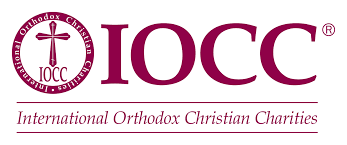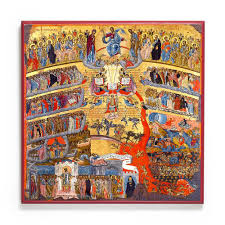In this two-part article, here’s what we’ll cover:
Today: 1 The Old Testament foundations.
2 The New Testament on “enlightened self interest” – did you ever think of it this way? Christ’s advice on how to use money to gain everlasting life, of the sort you’ll enjoy! And then Saint Paul on how to use money to gain financial security in this world.
Next week: The Holy Fathers
Old Testament teaching on Charity
Our written tradition of charity to the needy begins in the Old Testament Law. Just three examples among very many:
“When you harvest the crops of your land, do not harvest the grain along the edges of your fields, and do not pick up what the harvesters drop. Leave it for the poor and the foreigners living among you. I am the Lord your God.” Leviticus 23:22
Here is what the prophet Amos says comes from injustice to the needy: “Hear this, you that trample on the needy, and bring to ruin the poor of the land, saying, ‘When will the new moon [the beginning of the Hebrew month] be over so that we may sell grain, and the  sabbath so that we may offer wheat for sale? We will make the ephah small and the shekel great, and practice deceit with false balances, buying the poor for silver and the needy for a pair of sandals, and selling the sweepings of the wheat.’ The Lord has sworn by the pride of Jacob: Surely I will never forget any of their deeds.” Amos 8:4-7
sabbath so that we may offer wheat for sale? We will make the ephah small and the shekel great, and practice deceit with false balances, buying the poor for silver and the needy for a pair of sandals, and selling the sweepings of the wheat.’ The Lord has sworn by the pride of Jacob: Surely I will never forget any of their deeds.” Amos 8:4-7
“One-tenth of the produce of the land, whether grain from the fields or fruit from the trees, belongs to the Lord and must be set apart to him as holy.” Leviticus 27:30
Let’s talk about the “tithe”.
Today many evangelicals expect the tithe, which likely explains why they are building new churches all over the place. Mormons require the tithe, which may be one of the reasons why Mormons (did I say this last week?), despite their bizarre doctrines, are the fastest growing religion in the world.
Should the Orthodox Church require tithing? (If so, good luck. Most of us don’t come anywhere near.) At Saint Nicholas, Cedarburg, we’re now having Sunday presentations as part of our annual “stewardship” campaign. Last Sunday Nick Kasemeotes (I hope he doesn’t mind my mentioning him), one of our members who also is employed raising money for International Orthodox Christian Charities *, argued that the Old Testament “tithe” requirement is still in effect, that Christ never abolished the tithing rule. True. You’ll recall the episode when all the rich folks were presenting their elegant gifts in the temple, but then a poor widow came along and gave her offering. Jesus said “Truly I tell you, this poor widow has put  more into the treasury than all the others. They all gave out of their wealth; but she, out of her poverty, put in everything – all she had to live on.” Mark 12:43-44
more into the treasury than all the others. They all gave out of their wealth; but she, out of her poverty, put in everything – all she had to live on.” Mark 12:43-44
* Give to IOCC! – one of the finest and most efficient charitable organizations in the country. Look them up.
Furthermore, in the modern situation, how should we calculate a tithe? Does it mean giving ten percent to church only, or to church and charity? is it ten percent before or after taxes? Should we take into consideration that some of our tax money goes to the needs of the poor? ?? Nick said the answer to all the above questions is “Yes”! which means the “tithe” law can’t be defined precisely any more. So we’re on our own.
 However, it does help to have a personal standard of giving following a percentage (no matter how we calculate it), so that we’re not easily tempted to “slough off”. I told you last week how at Saint Nicholas, Cedarburg, we give 10% of income to charitable causes – and what the positive result for our parish has been.
However, it does help to have a personal standard of giving following a percentage (no matter how we calculate it), so that we’re not easily tempted to “slough off”. I told you last week how at Saint Nicholas, Cedarburg, we give 10% of income to charitable causes – and what the positive result for our parish has been.
Again, not to brag, but I think personal witness is important here: For many years my wife and I gave, well, what we felt we could – and we were forever struggling financially. Finally we decided to tithe 10% to church and charity, plus other gifts as we could afford them. Ever since our financial situation has improved dramatically. Of course, we have also worked our tails off till we retired. I can’t guarantee this will happen to everybody, but this has been our experience.
Below, read Saint Paul’s advice about this. Here again I think it’s that old principle: “God never allows anyone to outdo him in generosity”.
Christ’s Teaching on How to use Money to Save your Soul
Have you noticed that the Scriptures rarely (if ever?) ask us to give to charity out of sympathy for the poor. The appeal rather is to, as Peter said in another context, “Lord, what are we going to get out of this?” Matthew 19:27 “Enlightened self interest”!
In Christ, of course, the Old Testament Law and Prophets came to fulfillment. As I said last week, Christ said a lot about money, but he stressed that we need to give for the sake of our eternal life. Note the examples in last week’s Post: We give so we’ll have friends waiting for us on the other side, and so we won’t have to leave behind all we love.
Just three more examples here:
“Do good and lend, hoping for nothing in return; and your reward shall be great, and you shall be the children of the Most High; for He is kind to the ungrateful and to the evil.” Matthew 5:39-42, Luke 6:35
“So when you give to the needy, do not announce it with trumpets, as the hypocrites do in the synagogues and on the streets, to be honored by others. Truly I tell you, they have received their reward in full. But when you give to the needy, do not let your left hand know what your right hand is doing, so that your giving may be in secret. Then your Father, who sees what is done in secret, will reward you.” Matthew 6:1-4
Or take the Parable of the Last Judgment. This doesn’t refer specifically to money, but these days when the wealthy and the poor rarely live in the same neighborhoods (as they did long ago) we usually need to give money to aid “the least of these my brethren”. As we all know, at the  End Christ will say to us either “Come, you blessed of my Father, inherit the kingdom prepared for you from the foundation of the world”, or “Depart from me into the fire prepared for the devil and his angels.” Matthew 25:31-46 It’s the same appeal: It is definitely in our interest that we give to charity so that God won’t have to say to us, “Go to hell”.
End Christ will say to us either “Come, you blessed of my Father, inherit the kingdom prepared for you from the foundation of the world”, or “Depart from me into the fire prepared for the devil and his angels.” Matthew 25:31-46 It’s the same appeal: It is definitely in our interest that we give to charity so that God won’t have to say to us, “Go to hell”.
Saint Paul on How to use Money to gain Financial Security in this world
Now we bring the same principle “down to earth”, so to speak. This comes from 2 Corinthians 8 and 9, especially 9:6-11.
Here was the scene: Paul was collecting money, not for himself, (he supported himself by tent-making), not even for the churches he had founded. Instead, Paul had solicited pledges (as we would now call them) from his churches to aid the Christians of the Mother Church in Jerusalem where there was a famine. One of those churches was in Corinth.
Now a year or so had passed. Paul was writing to many of the churches that he was proud of his efforts. Paul mentions in this passage that the churches in Achaia (around Athens) had already “come through”. But should it surprise us that the Church in Corinth had not? If you listen to the summer Epistles you know what a “problem parish” Corinth was.
So Paul tells them he is sending Titus to “urge them along”, shall we say? so that their gift may be a matter of generosity, not a grudging obligation, so that they may be “cheerful givers”. I think Paul was double-talking  them. (He does this more than once in his Epistles.) He was in fact sending Titus to “put the screws on them” so they will give willingly! Likely Titus carried this letter along with him when he went to Corinth. Did the Corinthians ever pay up? I don’t think we know.
them. (He does this more than once in his Epistles.) He was in fact sending Titus to “put the screws on them” so they will give willingly! Likely Titus carried this letter along with him when he went to Corinth. Did the Corinthians ever pay up? I don’t think we know.
But something positive came out of Corinth’s stinginess. Paul here explains for them and for all future generations how to attain financial security. God has built this into the very nature of things.
He makes several points:
1 “He who sows sparingly reaps sparingly; he who sows bountifully reaps bountifully.”
God intends us to give a lot of our money away – so that when we do we will be re-paid. He says elsewhere that when we give out of our abundance to those who are needy, then when we are needy those whom we have helped will likely return the favor. And if they don’t, God will do so, one way or another. “Cast your bread upon the waters and it will return to you.”
Can we prove this theoretically? No. The only way we can find out if this works is if we give lots of money away and see what happens.
2 “Let each one give as he purposes in his heart, not grudgingly or of necessity for God loves a cheerful giver.”
Paul is afraid they will respond: Well, we’ll give, but we are going  to hate it – because it’s the only way to get Paul or the Priest or the stewardship chairman off our back.
to hate it – because it’s the only way to get Paul or the Priest or the stewardship chairman off our back.
People should not give because they’re pressured or out of guilt When I was pastor, I always told my people: If you hate giving to church or charity, if you’re going to give grudgingly, then keep your old money. We don’t want it. My treasurers always winced when I said that, but I meant it.
Because the real point of giving is not to support the church. God supports his Church. It’s not even to help the poor. If you don’t want to be charitable, God can raise up charitable people “out of these stones”, as John the Baptist said in another context. If we Orthodox don’t want to give to the poor he’ll find some Mormons or some Muslims (both of whom, by the way, give very generously) or somebody else who will do it for him, and in the end they’ll get the glory and the reward from him. And we won’t.
The real point of our giving is to build our own faith, so we can come to understand God’s financial system, and so we can attain financial security for ourselves, and then stop worrying about money. If we know and experience how God’s system works, then we will give cheerfully, gladly. So Saint Paul describes the principle behind this:
3 “God is able to give you all needful things so you may have an abundance for every good work. Now may he who supplies seed to  the sower and bread for food multiply the seed you have sown and increase the fruits of your righteousness, while you are enriched in everything for all liberality which causes us to give thanks to God.”
the sower and bread for food multiply the seed you have sown and increase the fruits of your righteousness, while you are enriched in everything for all liberality which causes us to give thanks to God.”
It is God who has given us what we have. Everything comes from God. There’s not a thing I’ve got that I can claim I worked up on my own.
Remember the atheist philosopher Ayn Rand? She seems to have gone out of style, but her principles certainly have not, even among  some Christians. She taught that we should not help people because it’s not good for them; they need to “pull themselves up by their own bootstraps”, as someone phrased it. (Someone else asked: But what if they haven’t got boots?) Where exactly do we find this teaching in the Scriptures? No matter what else we may think personally, the Scriptures speak only about giving. Probably because ignoring peoples’ needs has rarely been an issue!
some Christians. She taught that we should not help people because it’s not good for them; they need to “pull themselves up by their own bootstraps”, as someone phrased it. (Someone else asked: But what if they haven’t got boots?) Where exactly do we find this teaching in the Scriptures? No matter what else we may think personally, the Scriptures speak only about giving. Probably because ignoring peoples’ needs has rarely been an issue!
Brothers and sisters: Come on. Did you pull yourself up all by yourself? I certainly did not. God gave me life and energy. I didn’t create myself. God gave me parents who loved me and gave me a good foundation and taught me to work hard and invested a whole amount of money in me. God put me in an admirable country where at that time there was still a sense of community and social responsibility, and we had shared abundance with few super-ultra-rich and relatively few ultra-poor hanging on all by themselves. God put me in good schools. He gave me the Church and friends to support me. Was any of this my doing? I know that not everyone has had such advantages. But in that case we who have had them have been commanded by God to share them – and above all to share Jesus Christ, the Bread of Life.
It is God who supplies “seed for the sower”, so we can plant them. And it is God who multiplies the seeds. It is God who provides the fruits for us. And we can give and give and give for the rest of our lives and still not even begin to pay him back.
The Most Important Point
However – this is absolutely central – what is the chief result of all this sharing of money? The sharing of Love! A whole lot of love flows back and forth, and love for each other forever grows and binds people together.
But if you hang onto your money where’s the love? even for yourself! and you know where that will get you. Love, not money, is all that matters in the End. And now we’re back to the Poor Rich Farmer of last week.
Let’s sum all this up. In your own self interest: Give it away! Give it away! Give it away!
Next Week: The Fathers’ Teaching about Charity. This is tough stuff. Be prepared.
Week after Next: Saint Spyridon the Wonderworker
